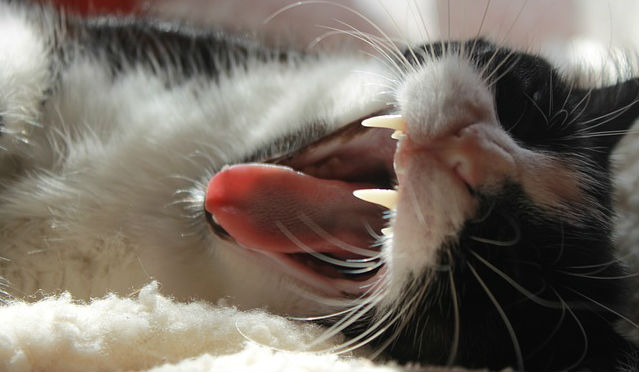Is anesthesia in cats necessary for a dental cleaning and what are the risks?
Original Question: Does my cat have to go under anaesthesia in order to get his teeth cleaned for a small infection or is there another way to do it? How dangerous is it for him to go under anaesthesia? (He’s had the blood work done to make sure he’s healthy enough to have the procedure done.) Thank you for your help! - Miranda
 Apr 26, 2018
Apr 26, 2018
Hi Miranda,
Thanks for your question.
This is a common concern that a lot of clients have asked me when it comes to dental care. You have to try and understand that using an ultrasonic scaler that vibrates 1000s of times a second and creates an incredibly high pitched whine will terrify any cat. This is only one of the reasons that we have to put patients under a general anesthetic to perform a feline dental cleaning and orthodontic procedures. Also, the scaling and cleaning are not only performed on the tooth surface, but also under the gum line which is exactly where the tooth lesions and cavities begin.
If there is an infection that they are trying to treat, it becomes even more important that they can freely access it and perform a procedure on it. Keep in mind that dental infections in cats can be incredibly painful and although you don’t think your animal is in pain, they can very easily hide it. Extreme oral discomfort does not reveal itself by your cat pointing at its mouth. It’s much more difficult to recognize. Pain can manifest itself in subtle ways, such as your cat not eating, not wanting to interact, hiding more, vocalizing more, and just not acting like themselves. In addition, dental disease such as infections can potentially travel into the bloodstream while the gum is traumatized during chewing. The invading bacteria can circulate and land in areas such as the kidneys, liver and heart. On occasion, however infrequently, we do encounter cases that have severe organ infections that started with a dental issue. This means that the very small, insignificant risk of complications with anesthesia in cats is far less than letting a dental infection progress.
You and your veterinarian have done a great job by performing pre-anesthetic blood work. In doing this, you have further reduced the chance of encountering an anesthetic issue. Not only that, but the results have indicated that the disease process has not advanced to a more severe level and gives you a baseline of information which can be referred to if any problems develop after the procedure. A dental procedure like this has minimal risk.
Keep in mind that a dental procedure like this may reveal further issues that your veterinarian may address during the procedure that were unexpected. For example, your veterinarian may find another area of infection or tooth decay that would indicate the need to perform further unanticipated procedures. It is quite common for this to happen and I would encourage you to allow your veterinarian to address any unanticipated concerns during this procedure. They may call and inform you of this during the anesthetic and you may feel like it is unfair. It would certainly be a bit more costly. However, I want you to know that if your veterinarian did not address it during the procedure, you would just have to go through the whole entire procedure again at a later date.
To get personal, I’m not trying to support your veterinarian and blindly encourage you to follow their advice. Before my current cats, I always owned senior cats. I diligently addressed their oral health and performed dental cleanings on them annually even after the age of 20. They all lived to a wonderful mature age of between 20 to 22 years old. I am personally convinced this occurred because I was proactive about their health and performed dental cleanings under annual, and even biannual, general anesthetic procedures to maintain their good dental health. Putting the textbooks and appropriate medical answers aside, I personally experienced the value of this myself, and this is the real reason why I present these points to you.
I hope you find the same success. It sounds as though you are well advised and taken care of by your current veterinarian.
All the best.
Dr. Clayton Greenway


Disclaimer: healthcareforpets.com and its team of veterinarians and clinicians do not endorse any products, services, or recommended advice. All advice presented by our veterinarians, clinicians, tools, resources, etc is not meant to replace a regular physical exam and consultation with your primary veterinarian or other clinicians. We always encourage you to seek medical advice from your regular veterinarian.

